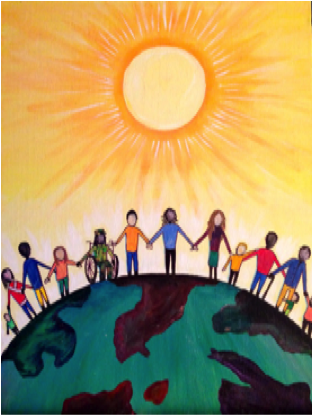Mexico City, Mexico
On September 19, 2017, a 7.1 earthquake struck Mexico City and its surroundings resulting in widespread destruction and more than 200 deaths. Shortly after, we were contacted by multiple people in the U.S. and in Mexico who were either trained in or familiar with our Community Resiliency Model (CRM)®. Since then, we sent a CRM team down to Mexico City to provide a 5-day CRM Teacher Training to professionals and nonprofessionals in that community.
As Mariel Andrade, a psychologist located in Mexico City wrote:
"We are finding several problems of adaptation in people’s reactions to displacement, especially with business owners and managers, who are not accepting that their buildings are not fit for work anymore...The main problems are:
People are scared of entering the buildings or re-inhabiting their houses
Other people refuse to leave damaged buildings and office workers are being forced to work in perilous conditions.
People that are not around damaged buildings are scared to go into their houses and offices, and –understandably– are specially scared of the places where they lived at the time of the earthquake.
Other immediate psychological reactions that have affected the population are akin to acute trauma responses such as:
Constant fear of an aftershock.
Hyper-attention to movement in their surroundings.
Nausea, feelings of dizziness.
Feeling that the ground moves around them.
Constant hearing of the seismic alarm.
Insomnia due to anxiety or fear of not hearing the alarm while they sleep.
Hyperarousal and –in some cases– dissociative states.
The Community Resiliency Model (CRM) training provided by the TRI will be the foundation for our action plan. We had been searching for a transferrable and sustainable tool that could help us maximize our reach within the affected communities. Not only for Mexico City, but also for marginalized communities in rural areas of the country that don’t have enough mental health professionals and are more difficult to access...The CRM model could enhance our skills and help communities build resiliency using culturally sensitive techniques. Further, it could help lower the distress caused by different problematics affecting the country (e.g. drug violence, corruption, recurrent natural disasters, and sexual violence). We are proposing a plan that will allow, encourage, and – to some extent – expect those trained in CRM to work initially (i.e. the first month to two) in shelters and services around Mexico City and, later on, with leaders of smaller communities around the country (e.g. Chiapas, Oaxaca, Guerrero, Morelos, etc.). Considering CRM is a model that teaches how to heal and help others heal, it will ideally help not only to provide psychoeducation on distress tolerance skills and effective tools to manage trauma-related stress, but also build compassion and collaboration within and without communities, and foster the natural coping resources of people. Building strong bonds and a sense of trust between members of the communities is a fundamental need we have as a country."
The best way to bring greater healing to the people in Mexico impacted by this earthquake is to train local community members to be CRM Teachers. We provided a 5-day training that included student teaching. All of our materials were already translated into Spanish. At the end of the training, the trainees were provisionally certified to teach the wellness skills to their friends, families and community. You don’t have to be a mental health counselor to take this training. Natural leaders of the community, as well as mental health professionals, make some of the best teachers. The model is not “therapy” (although it is therapeutic) and it can be learned simply. CRM skills can be very easily integrated into the activities of daily living.
